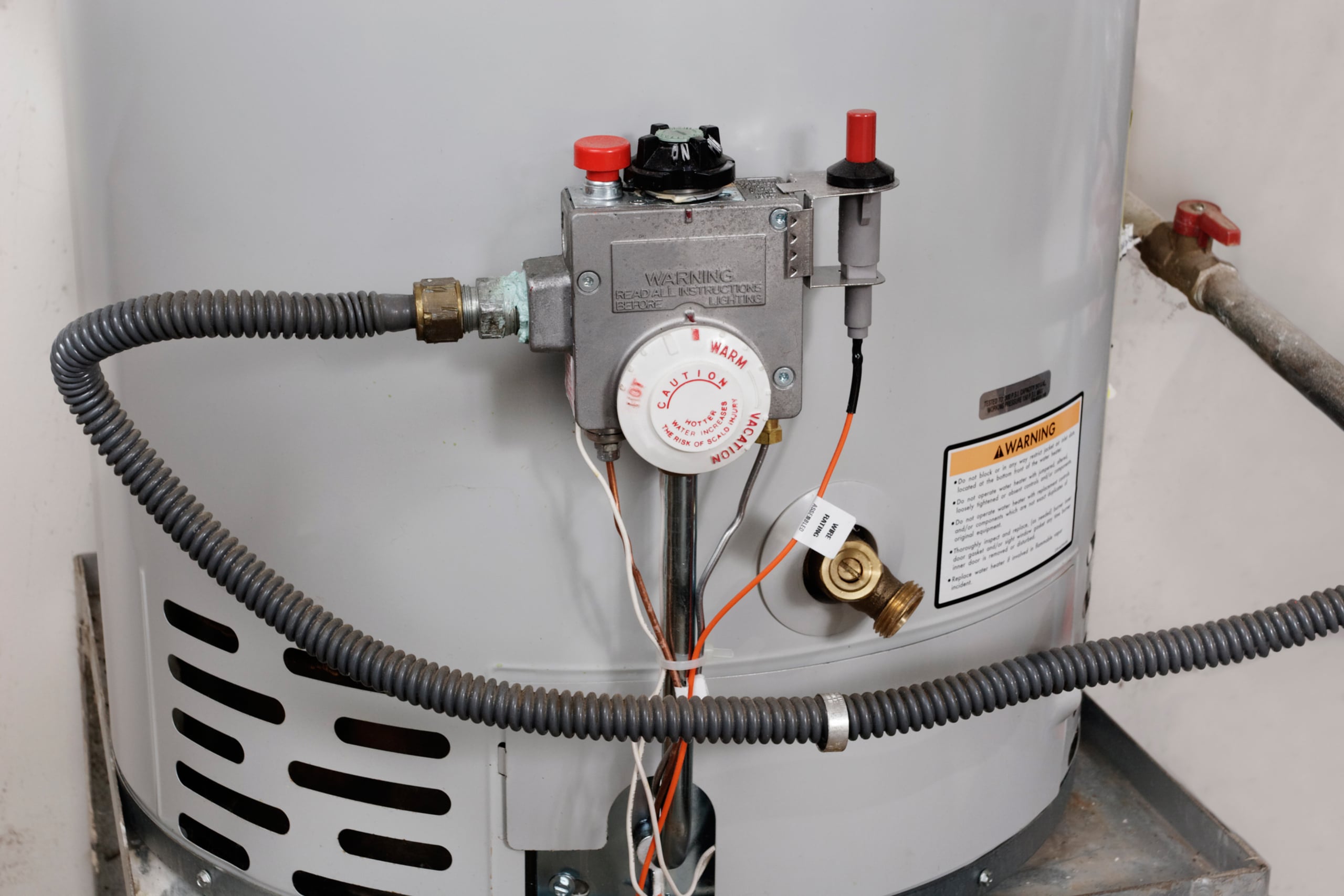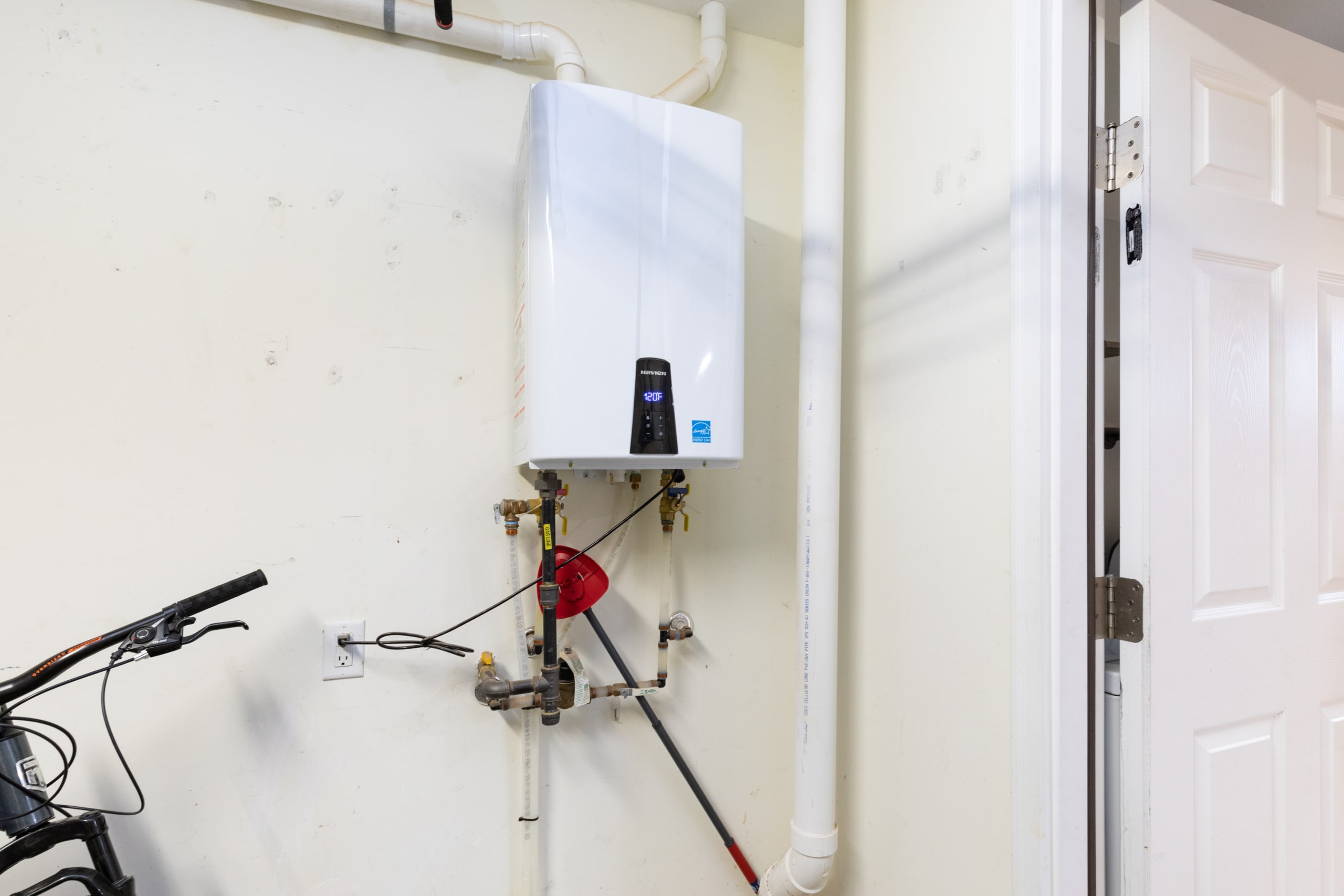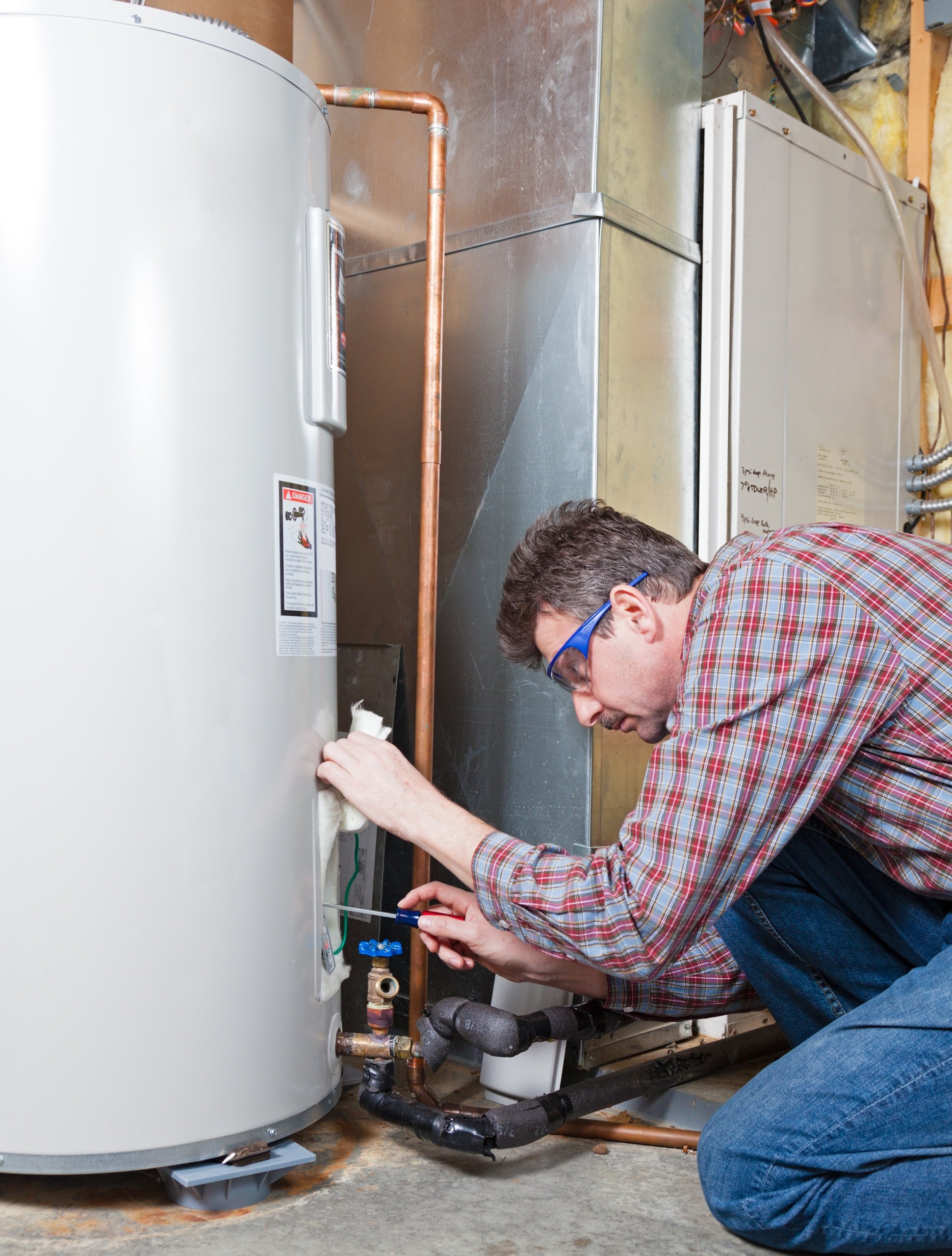Tankless and tank water heaters both provide hot water when you turn on the appropriate faucets. Storage tank water heaters always keep water hot, which can lead to higher energy costs. Tankless units heat water on demand but may be more expensive upfront than traditional tank water heaters.
Table of Contents
- Understanding the Basics – Tank vs Tankless Water Heaters
- Traditional Tank Water Heaters
- Tankless Water Heaters
- Comparative Analysis – Tankless Water Heater vs Traditional
- Choosing the Right Water Heater
- Installation and Maintenance
- FAQs
Understanding the Basics — Tank vs Tankless Water Heaters
Whether or not a unit has a storage tank is the main difference between tankless and tank water heaters. A tank water heater, also called a storage water heater, has a large tank. Water is held in this tank at a hot temperature and released as needed. A tankless water heater doesn’t always keep a hot water supply ready. Instead, it heats the water on demand when someone in the home turns on hot water at the tap.
Traditional Tank Water Heaters
Traditional units have a water heater tank. These types of heaters date back to the end of the 19th century when a mechanical engineer in Philadelphia invented the first storage water heater. Many people favor tank water heaters because they’ve been around for over a century and are tried-and-true home appliances[1].

Here’s a quick rundown on how such water heaters work:
- Cold water from the home water line flows into an insulated storage tank.
- Components within the tank and water heater—including a gas or electric heat source—heat up the water.
- Hot water rises to the top of the tank.
- When you turn on hot water anywhere in the home, hot water from the top of the tank flows through the pipes and to that faucet.
- Cold water flows into the bottom of the tank to replace the water that was used, and the process repeats itself.
Pros of tank water heaters
- Generally, tank water heaters cost less than tankless models upfront.
- A quality tank water heater is more likely to supply enough hot water to multiple faucets simultaneously, such as if someone is washing dishes while another person showers.
- Typically, storage water heaters have simpler maintenance and repair requirements than tankless models.
Cons of tank water heaters
- Hot water isn’t heated on demand, which means you may have to wait between uses if someone has depleted the supply with a long shower.
- You may see higher energy costs than you would with a tankless model.
- Leaks in the storage tank could put other areas of your home at risk for serious water damage.
Tankless Water Heaters

Unlike traditional tank heaters which constantly heat a reservoir of water, Tankless water heaters rapidly heat water on demand. Cold water enters the small tankless unit when a hot water tap is opened. Sensors trigger powerful gas burners or electric heating elements which heat the flowing water instantly, rather than over time in a storage tank. This on-demand operation means endless hot water and more efficiency since water is only heated when needed, not in advance.
For many homeowners, the endless hot water perks of tankless operation make them attractive space-saving and eco-friendly alternatives to old-fashioned tank heaters.
Pros of tankless water heaters
- Because they don’t keep water hot all the time, tankless systems tend to reduce energy consumption and lead to potential utility cost savings.
- Tankless water heaters may last longer than tank-based systems.
- A tankless water heater ensures an endless hot water supply by heating it on demand directly from the water lines.
- Tankless models have fewer leak and water damage risks without a storage tank holding water.
Cons of tankless water heaters
- You may spend more money upfront on the unit, though that depends on a variety of factors.
- It can take longer for hot water to start flowing out of the faucet when you turn it on than you experience with a storage tank model.
- You may need to make changes to your heating source or plumbing elements if you’re switching from a tank water heater to a tankless unit.
Comparative Analysis — Tankless Water Heater vs Traditional
Consider the big picture before deciding which type of water heater is right for your home.
Generally, a tank water heater costs less to buy and install than a tankless model. That’s especially true if you must make accommodations in the home to ready it for a tankless water heater. However, this isn’t always the case, so do specific research to price options in your area that are right for the size of your family and their hot water needs.
Next, consider efficiency. Depending on how much water you use on a daily basis, a tankless water heater can be 8% to 34% more efficient. Typically, homes that use hot water at a rate of 41 gallons or less per day see the most significant efficiency win[2]. That efficiency leads to lower operational costs for tankless water heaters compared to models with storage tanks.
According to information published by ENERGY STAR, a tankless water heater that is ENERGY-STAR qualified can help you save money. In a home with four people and average hot water consumption, the savings are an average of $95 annually. That’s around $1,800 for the water heater’s lifetime[3].
Finally, the expected longevity of the unit also matters. On average, a regular tankless water heater lasts longer than other types except solar-powered systems. Tankless and solar systems both have an expected longevity of about 20 years compared with other options, such as
- Storage, or tank, water heaters: 10-15 years
- Tankless coil water heaters: 10 years
- Indirect water heaters: 10 years
- Heat pump-powered water heaters: 10-15 years
Choosing the Right Water Heater
Once you decide whether you want a tankless water heater vs traditional, there are other factors to consider in making the right purchase for your home. Some critical factors in selecting the right water heater include[4]
- Heating method and fuel type. Usually, you want a water heater that matches the system already in your home. For example, if you have an electric water heater, the simplest replacement option would be another electric model. However, there are reasons for switching heating methods and fuel types. You may need to do some work or pay more for installation work to support such a swap.
- Energy savings. Energy savings is a notable feature of modern water heaters, many of which are ENERGY STAR qualified. This certification signifies potential utility cost savings compared to less efficient models. Additionally, it’s worth noting that ENERGY STAR units may qualify for tax credits, particularly under the Inflation Reduction Act[5].
- Size of the unit. Realistically consider the size of your household and how much hot water you use daily. If you purchase a water heater that can’t keep up with your hot water needs, it’s more than an annoyance. You may stress the unit with hot water demands it wasn’t designed to meet, which can reduce overall longevity or lead to expensive repairs.
- Cost. Total cost is often a major factor for most families when buying a water heater. Consider your options and the big picture to understand the total ownership cost over time.
- Warranty and/or service plan. Ask about what type of manufacturer’s warranty a unit comes with and what service plans are available. Knowing your water heater is covered for maintenance and repairs for a certain amount of time can provide added peace of mind for your purchase.
Installation and Maintenance
Professional installation from qualified HVAC and plumbing technicians, such as those at Hoffmann Brothers, work diligently to ensure quick, proper installation of any kind of water heater in your home.

If you’re simply swapping out a unit, replacing it with a similar option, installation is usually fairly quick. This is also the least expensive installation option, though you also have to consider the upfront and long-term costs of the unit itself[6].
Installing a tankless water heater when you previously had a tank water heater may require additional work. This can increase installation costs, as many service providers quote total installation costs based on how many hours the work will take and the required parts.
On average, tankless water heaters require less routine attention when it comes to ongoing maintenance. They also are less likely to need repairs, as they need a tank that could become damaged or prone to leaks. However, in some cases, repairs to tankless water heaters might cost more or be more complex when needed.
With tankless options lasting five years or more on average longer than tank water heaters and driving efficiencies and energy cost savings over their entire life, many people choose to go tankless with a new water heater.
An experienced professional can help you understand what might be suitable for your home.
Tanked Vs Tankless FAQ
You might be able to take advantage of tax incentives for choosing ENERGY STAR-qualified appliances that reduce your overall utility use in the years to come. Ask about tax incentives or rebates when you discuss water heater options with a professional.
Yes, you can use a tankless water heater if you have well water. Some worries about well water include the hardness of the water and low water pressure. These would be concerns with a tank water heater, too, though. In fact, in the case of hard water, it can be more of an issue for a tank water heater. If you have well water, discuss your concerns with your installation professional so they can make proactive recommendations for protecting your appliance and supporting the flow of hot water throughout your home.
In most cases, a tankless water heater works fine in cold climates. However, factors such as whether you purchased the right size water heater, had it installed correctly, and are using the right type of heating can impact performance.
Yes, you can replace a storage-tank water heater with a tankless model. It may involve retrofitting or other installation work to ensure the proper setup.


